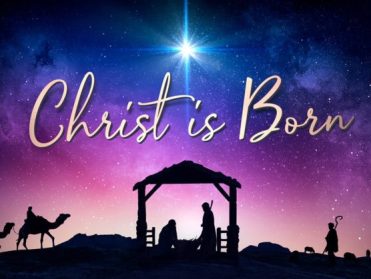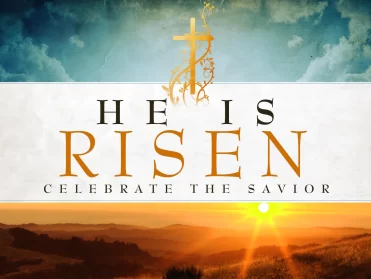Christ is the King, High Priest and Judge.

- March 12, 2024
- By EB Church
- No Responses
Each of us has our favorite books, chapters, and verses in the Bible. We often reread them, finding in them a source of comfort in the midst of this confusing world. For some it is Psalm 22, for some it is the last chapters of the book of Job, for some it is the book of Revelation.
When it comes to the verse we most often share with the world, it has to be John 3:16, the most famous and quoted passage.
For many people today, the favorite verse is Matthew 7:1, “Judge not.” These people don’t need context – half the verse is enough Bible for them.
Today I’d like to look at something else – the passages of Scripture most often quoted by the biblical authors themselves. We believe in the divinely inspired nature of Scripture, and we can also say that these are the texts that were most often quoted under the inspiration of the Spirit of God – or in other words, the texts that were most often addressed by God Himself!
So, what verses are these? It is not particularly difficult to discover them, as two verses stand out among all the others. Among the Old Testament writers, the most frequently quoted verse is found in Exodus: “who keeps lovingkindness for thousands, who forgives iniquity, transgression and sin…” (Exodus 34:7).
These memorable words were spoken to Moses by God concerning the character of His person. They are repeated again in Num. 14:18-19, where Moses reminds God of them, and they are quoted repeatedly in the writings of later Biblical authors.
The passage is quoted, for example, three times in the book of Psalms alone. In Ps 86:15 David quotes it in prayer for God’s favor, and in Ps 103:8 and 145:8 he quotes it again in praise of God’s works. The prophets Jonah (Jonah 4:2), Joel (Joel 2:13), Micah (Micah 7:18), and Nehemiah (Nehem. 9:17, Nehem. 9:31) also quote it, and it is referenced in other verses, such as in 2 Chr 30:9 when King Hezekiah urged the people of Judah to return to God.
The New Testament frequently cites Old Testament texts (several hundred references, actually over 2,000 if indirect footnotes and indirect references are included).
The second most frequently quoted verse from the Old Testament in the New Testament is Lev 19:18: “Love your neighbor as yourself.”
This verse appears in seven different places in the NT, while the vast majority of other verses quoted appear only once or twice.
So which Old Testament text is mentioned most often?
This text is found in the book of Psalms: “The Lord said to my Lord, ‘Sit at my right hand, until I make your enemies a footstool for Your feet'” – Psalms 110:1
Mt 22:44; Mt 26:64; Mar 13:36; Mar 14:62; Mar 16:19; Lk 20:42-43; Lk 22:69; Acts 2:34-35; Acts 5:31; Acts 7:55-56; Rom 8: 34; 1Cor 15:25; Eph 1:20; Col 3:1; Heb 1:3, Heb 1:13; Heb 8:1; Heb 10:12-13; Heb 12:2; 1Pet 3:22-24, Rev 6:17, Rev 19:17-18. Ps 110:4-7 times (Jn 12:24; Heb 5:6, Heb 5:10; Heb 6:20; Heb 7:3, Heb 7:17, Heb 7:21).
This verse is quoted or referred to about 24 times – seven of the nine New Testament writers, the words “The Lord said to my Lord” were often used by Christian writers as an expression of the divine nature of Jesus Christ along with God the Father. In Matthew 22:44 we see that Jesus Himself refers to this verse to emphasize that the Messiah is not only the son of David, but also the Lord of David.
But that is not all. The line Ps 110:4 from this same psalm gets almost an entire chapter of commentary in the Bible itself (Heb 7:11-28). Apparently the apostles and prophets saw this messianic psalm as highly significant to their understanding of Jesus.
The difference between our favorite passages and our “favorite” New Testament passage is stark. God wants us to understand that Jesus is the Victor, the King, and the Judge. This is so important for us to understand that God tells us over and over again.
Psalm 110 describes the Anointed One (Christ, Jn 1:41) subduing His enemies and blessing His faithful subjects as King-Priest-Judge. The events of Psalm 110 find their fulfillment in Jesus. (Luke 24:44-45)
1. CHRIST IS KING. Psalm 110:1-3.
The Psalm begins with the Lord David’s (the Sovereign) ascension to His Throne. We see that all things are subject to Him. He rules with authority. He will defeat all enemies during His Reign. He will restore and redeem His People.
The apostles absolutely saw the fulfillment of this in Jesus – Acts 2:32-36; Eph 1:20-23, 1Cor 15:25-26; Heb 1:3-9; 1Tim 6:15.
Do we realize it? Do we believe it?
Our purpose here on earth is to glorify God, but we are so often fearful and too timid to even mention His name. How can we glorify Him whose name we often dare not even speak publicly?
God wants to encourage us by informing us that Jesus already reigns! “The Lord said to my Lord, ‘Sit at my right hand, until I make your enemies a footstool for Your feet.’ The Lord will stretch forth Your strong scepter from Zion, saying, “Rule in the midst of Your enemies.”
2. CHRIST IS THE ETERNAL GREAT HIGH PRIEST. Psalm 110:4.
His divine eternal appointment, not by earthly descent, guarantees access to God’s favor. Hebrews 5:1-6; Hebrews 7:12-14; Hebrews 8:4. Our salvation and service to God would not be possible without our High Priest, Heb 10:19-25. He is the “King of Righteousness and Peace,” Jer 23:5; Zech 6:12-13.
3. CHRIST IS THE JUDGE. Psalm 110:5-7.
He will judge the nations. His judgment is His wrath against sin. His word executes judgment, granting mercy to those who trust in Him.
In Latin, Psalm 110 is known as Dixit Dominus (“The Lord says”). It is considered both a royal and messianic psalm. This psalm is a cornerstone in Christian theology, as it is often cited as proof of the Trinity and the superiority of Jesus as King, High Priest, and Messiah. For this reason, Psalm 110 is the most frequently quoted or referenced psalm in the New Testament.
Few psalms have had such an impact on the New Testament writers; none are quoted so often. Just consider that every time you read about Jesus “at the right hand of God,” you hear an echo of Ps 110:1 (Mt 26:64; Mar 14:62; Luk 22:69; Acts 5:31; Acts 7:55-56; Rom 8:34; Eph 1:20; Col 3:1, etc.).
The Epistle to the Hebrews devotes a huge portion of its text to a discussion of the Melchizedek priesthood, relying on the only text that speaks of it, Ps 110:1. Indeed, Ps 110:4 is the kind of “solid food” that the author of the letter speaks of in Heb 5:13-14 (Heb 5:11-14; 6:20).
In other words – our understanding of Psalm 110 can also be an indication of our spiritual maturity.
“Honor the Son” – Ps 2:12; Ps 110:3. Obey the King and be saved by the grace of God that is made available through the High Priest, or else the wrath of the Judge awaits you!
May the reading of Psalm 110 be a blessing and a special encouragement to us also in these Easter days, when we proclaim with special reverence the victory of our King and Savior.
Tags:
Share:
You May Also Like
Categories
- Проповеди (6)
- Размышления (6)






Leave A Comment